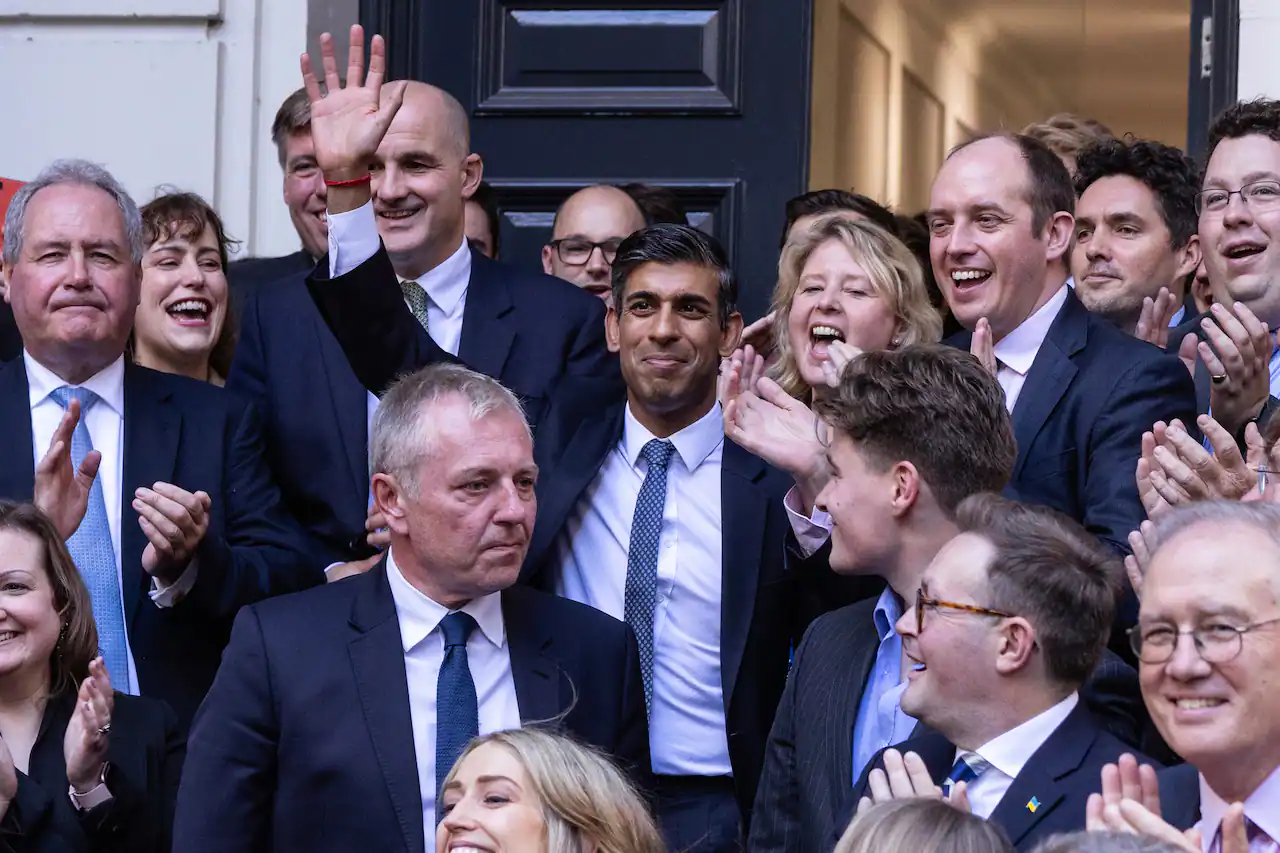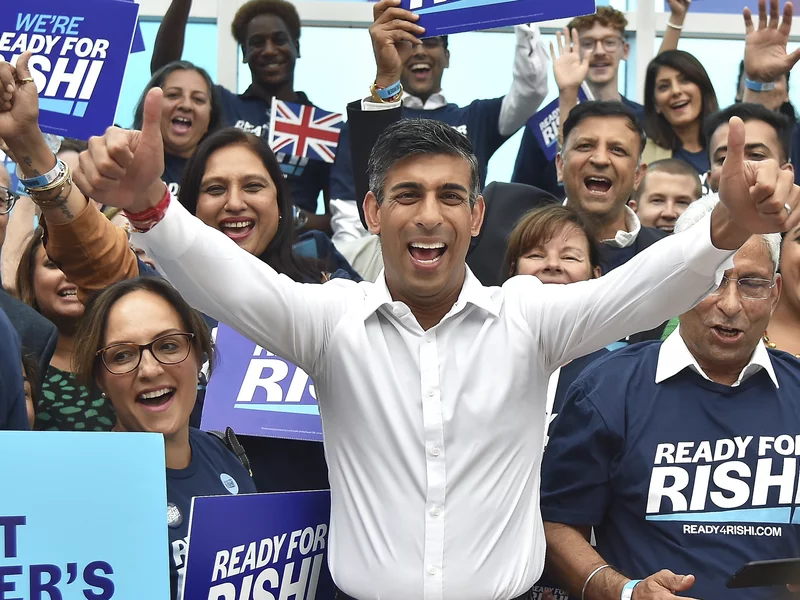History was made as Rishi Sunak, a British citizen of Indian Heritage has been chosen as Britain’s youngest Prime Minister on Monday, October 24th, 2002. As the leader of the United Kingdom, Sunak has been tasked to steer the economically floundering nation days after his predecessor Liz Truss stepped down, conceding defeat. At age 42, he is the youngest and the first person of color to hold the post. The former Goldman Sachs analyst will be the United Kingdom’s first prime minister of Indian origin.
Rishi Sunak becomes Britain’s next prime minister after he won the race to lead the Conservative Party, leaving him with the task of steering a deeply divided country through an economic downturn set to leave millions of people poorer. In his first address to the people after being named Prime Minister, Rishi Sunak said it was the “Greatest privilege of my life…Will work day in and out to deliver”.
Sunak, one of the wealthiest politicians in Westminster has been asked to form a government by King Charles, replacing Liz Truss, the outgoing leader who only lasted 44 days in the job before she resigned. He defeated centrist politician Penny Mordaunt, who failed to get enough backing from lawmakers to enter the ballot, while his rival, the former prime minister Boris Johnson, withdrew from the contest saying he could no longer unite the party.
 “This decision is a historic one and shows, once again, the diversity and talent of our party,” Ms Mordaunt said in a statement as she withdrew from the race just minutes before the winner was due to be announced. “Rishi has my full support.”
“This decision is a historic one and shows, once again, the diversity and talent of our party,” Ms Mordaunt said in a statement as she withdrew from the race just minutes before the winner was due to be announced. “Rishi has my full support.”
Sunak, the former finance minister, becomes Britain’s third prime minister in less than two months, tasked with restoring stability to a country reeling from years of political and economic turmoil. The multi-millionaire former hedge fund boss will be expected to launch deep spending cuts to try to rebuild Britain’s fiscal reputation, just as the country slides into a recession, dragged down by the surging cost of energy and food.
He will also inherit a political party that has fractured along ideological lines, a challenge that damaged the fortunes of several former Conservative leaders. Britain has been locked in a state of perma-crisis ever since it voted in 2016 to leave the European Union, unleashing a battle at Westminster over the future of the country that remains unresolved to this today.
Boris Johnson, the face of the Brexit vote, led his party to a landslide victory in 2019, only to be driven out of office less than three years later after a series of scandals. His successor Liz Truss lasted just over six weeks before she quit over an economic policy that trashed the country’s economic credibility.
Economists have questioned whether Sunak can tackle the country’s finances while holding the party’s multiple warring factions together. Rishi Sunak came to national attention when, aged 39, he became finance minister under Boris Johnson just as the COVID-19 pandemic hit Britain, developing the successful furlough scheme.
Sunak’s family migrated to Britain in the 1960s, a period when many people from Britain’s former colonies moved to the country to help it rebuild after the Second World War. After graduating from Oxford University, he went to Stanford University where he met his wife Akshata Murthy, whose father is Indian billionaire N. R. Narayana Murthy, founder of outsourcing giant Infosys Ltd.
The fact such a senior political leader in Britain has a family background that is nonwhite — with both his parents of Indian origin — has only become commonplace in the past handful of years. “That is a very, very recent development,” says Sunder Katwala, director of British Future, a think tank that researches issues around immigration, integration, race and identity.
He says since David Cameron became prime minister, the Conservative Party has placed an emphasis on putting more ethnic minorities in senior positions inside the government. “Ethnic diversity has become a new normal at the top table of British politics,” Katwala acknowledges. “In the last five years, we’ve seen ethnic minority chancellors of the Exchequer, home secretaries, foreign secretaries at a remarkable pace. Everyone’s got used to that and everybody thinks you shouldn’t make too much of that.”
 Bronwen Maddox, the chief executive of the London-based think tank Chatham House, says that one silver lining amid all the chaos of recent weeks is that it “has forced someone with economic competence to the top of the Conservative field, and it has also forced Labour, the main opposition party, to put together a platform based on a claim to financial coherence, competence, things that Labor hasn’t always been associated with in the past.”
Bronwen Maddox, the chief executive of the London-based think tank Chatham House, says that one silver lining amid all the chaos of recent weeks is that it “has forced someone with economic competence to the top of the Conservative field, and it has also forced Labour, the main opposition party, to put together a platform based on a claim to financial coherence, competence, things that Labor hasn’t always been associated with in the past.”
Congratulating Rishi Sunak, Prime Minister Narendra Modi tweeted, “I look forward to working closely together on global issues, and implementing Roadmap 2030. Special Diwali wishes to the ‘living bridge’ of UK Indians, as we transform our historic ties into a modern partnership”.
Considered a centrist and pragmatic politician, he emerged in the latest leadership contest as a safe pair of hands to guide the U.K., after Liz Truss’ policy proposals around tax cuts and spending shook the government’s credibility and spooked markets.
Sunak’s rise in British politics has been nothing short of meteoric. After entering Parliament in 2015 after a career in banking, Boris Johnson appointed him just five years later as finance minister — a role formally known as chancellor of the Exchequer, the U.K.’s Treasury.
Financial markets have reacted calmly as it emerged that Rishi Sunak is set to be the UK’s next prime minister. The pound was broadly unchanged against the dollar on Monday afternoon and government borrowing costs stayed lower after Commons leader Penny Mordaunt dropped out of the leadership race.

 “This decision is a historic one and shows, once again, the diversity and talent of our party,” Ms Mordaunt said in a statement as she withdrew from the race just minutes before the winner was due to be announced. “Rishi has my full support.”
“This decision is a historic one and shows, once again, the diversity and talent of our party,” Ms Mordaunt said in a statement as she withdrew from the race just minutes before the winner was due to be announced. “Rishi has my full support.” Bronwen Maddox, the chief executive of the London-based think tank Chatham House, says that one silver lining amid all the chaos of recent weeks is that it “has forced someone with economic competence to the top of the Conservative field, and it has also forced Labour, the main opposition party, to put together a platform based on a claim to financial coherence, competence, things that Labor hasn’t always been associated with in the past.”
Bronwen Maddox, the chief executive of the London-based think tank Chatham House, says that one silver lining amid all the chaos of recent weeks is that it “has forced someone with economic competence to the top of the Conservative field, and it has also forced Labour, the main opposition party, to put together a platform based on a claim to financial coherence, competence, things that Labor hasn’t always been associated with in the past.”